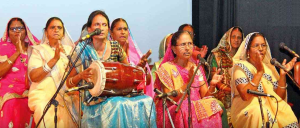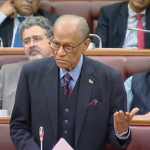By Dawood Auleear
This week marks the launching of Bhojpuri Mahotsav 2024 in Mauritius with the participation of international delegates and local organisations: Bhojpuri Speaking Union, the MGI and Aapravasi Ghat Trust Fund. The opening ceremony will be performed by our Prime Minister and the closing ceremony by our President. This gives a strong signal that the Government cares about Mauritian oral heritage. If we are ready to spend fabulous sums of money to save rare species, it is also legitimate to invest to save a language that makes us human. Transmission of human culture, songs, stories and poems was done orally before the invention of writing. Unfortunately many aspects of our culture have been lost and buried with our old folks. As examples of an oral tradition, Africans have committed to memory their lineage and the Quran has been preserved through our Hafez ul Quran.
It would be a commendable move to keep alive Bhojpuri, the mother tongue initially of about 65% of Mauritians [both Hindus and Muslims]. I am a native Kalkateea speaker. I don’t understand who has called it Bhojpuri and why. Kalkateea, as a language, has evolved into a form that makes it quite different from the versions spoken among other Indian diasporas. I noticed that during an exchange with a Bihari participant at an international conference. We speak Kalkateea in my family today as do a large number of rural families and a small number of urbanites – my grandmother was a singer at “Raat Jagai” and Harparaori. Bhojpuri is a fascinating language that has its unique way to convey its culture, its way of interpreting human behaviour and emotion. For instance, how would one translate into local languages a ‘bisaine’ fish or a ‘panchochar’ curry?
The dominant culture and especially the dominant languages have played havoc on this oral Indian tradition. The majority of people in Mauritian villages do not sound like they are of Bihari origin – the youths speak creolpuri [my coining of mixed creole and Bhojpuri]. All over the world minority languages are being threatened by socially, politically and economically dominant forces to such an extent that many linguists believe that 50% of them would be extinct by the end of this century.
Bhojpuri is a dying language here as not many efforts are made to protect it. The first transmitters of language are families but the upwardly-mobile Indo-Mauritian families, the natural role models, are prioritising languages other than what is their ancestral lingua franca.
Bhojpuri cannot be saved by just creating MGIs and BSUs only. They must be given the means to do the job with generous and sincere hearts at the head. To show what I mean, I have unfortunately to tell my own story, although fearing at the same time to be criticised for blowing my own trumpet.
I was one of the main characters taking part in a Bhojpuri-language drama on MBC TV in 1968. I had been involved with three Anthropology Professors of international standing studying Bhojpuri traditions. I collected Bhojpuri folk tales, perhaps out of nostalgia as I used to enjoy the tales told by storytellers during funeral wakes or after lunch sitting in the shade of big trees along village streets or at times when grannies met over hookka, paan and tea. I am pleased that for them I used international phonetics and translated them into English under the guidance of Professor Lee Haring of New York University. When we wanted to publish them in book form, our request was turned down by the big ‘Mauritian Saviors’ of Bhojpuri whom we had approached. But an Indian publisher who had received our request published the book. I tend to believe that our book, “Folk Tales from Mauritius” is still unique and can be consulted at the Library of Congress, at the British National Library, at the Mauritius Institute and at the National Assembly library.
Every week I get notifications of researchers consulting the book. One speaker at the Mahotsav this week even brought a Japanese social scientist, who had read the Folk Tales from Mauritius, to visit me in my house. The Aapravasi Ghat Trust fund must still have some copies of the book in stock. But again here we go. A Bhojpuri event is taking place in my own country. Organisers have identified resource persons living thousands of miles away. And I am invisible. By the way, allow me to add a bit of Mauritian reality. Not a single Muslim name appears on the list of participants as if to say that they are strangers to this language. Is it GHAR KE MURGI DAAL BARABAR? [Nobody is a prophet in his own country] or…?




![[Yoga] A shared legacy, a shared future](https://sundaytimesmauritius.com/wp-content/uploads/2025/06/Yoga-Article-HC-218x150.jpg)
![[Khutbah – La Réflexion du Vendredi] Tawakkul, la confiance absolue en Allah (swt)](https://sundaytimesmauritius.com/wp-content/uploads/2025/06/Tawakkul-218x150.jpg)

![[Poetry corner] In memory of my friend Swabir Goodur](https://sundaytimesmauritius.com/wp-content/uploads/2025/04/CASAM-218x150.jpg)
![[Doha Football Academy] Eid Cup 2025](https://sundaytimesmauritius.com/wp-content/uploads/2025/06/c34ff12a-6673-4967-9709-cd171a61efd6-1024x683-1-150x150.jpg)
![[Ex-parlementaires] Les manifestants du MSM renonceront-ils à leur pension ?](https://sundaytimesmauritius.com/wp-content/uploads/2025/06/pic-150x150.jpg)


![[Doha Football Academy] Eid Cup 2025](https://sundaytimesmauritius.com/wp-content/uploads/2025/06/c34ff12a-6673-4967-9709-cd171a61efd6-1024x683-1-100x70.jpg)
![[Ex-parlementaires] Les manifestants du MSM renonceront-ils à leur pension ?](https://sundaytimesmauritius.com/wp-content/uploads/2025/06/pic-100x70.jpg)
